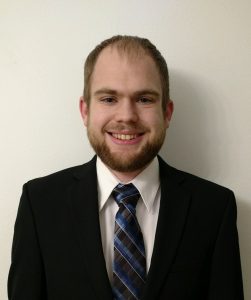
Mechanical engineering graduate student Joel Lynch recently received a $2500 grant from the Iowa Space Grant Consortium to study the coupling of microwave fields with solid rocket propellant combustion.
His current project is entitled “Modeling of Flames Seeded with Alkali Compounds under the Presence of Alternating Electric Fields.” The research is taking place within the Nanoscale Energetics Lab overseen by Travis Sippel, an assistant professor of mechanical engineering.
“Dr. Sippel’s research group seeks to understand and utilize coupling between alternating electric fields and solid rocket propellant combustion,” said Lynch, who is pursuing a PhD. “The combination of the two creates a plasma environment that can be extremely useful in enhancing and controlling propellant combustion. There are a number of uses of this coupling, such as providing dynamic control of rocket motors and enhancing rocket motor efficiency.”
Through this research, Lynch will develop computational models
“My portion of this effort is to develop computational models that can capture the plasma kinetics and transport phenomenon observed in our experiments. We hope these models can provide insight into how to further improve this enhancement technique,” he said.
One of the thrusts of the Nanoscale Energetics Lab is to develop energetic materials and energetic material additives that can improve energetic material combustion (e.g. the combustion of a rocket propellant, pyrotechnic, or an explosive).
“Much of the lab’s research is experimental and while experimentation is useful and demonstrative, the experimental diagnostic measurement of energetic material flames is quite difficult because of the fast timescales of combustion events, the varying sizes of ingredients and flame features, and the multiphase – solid, liquid, and gas – nature of the combustion environment. In dynamically controlling an energetic material with an electromagnetic field and/or plasma, we have added additional layers of complexity to this already difficult problem,” said Sippel.
“Joel’s research is computational, and aims to develop simulations of microwave-plasma interaction with flames in order to gain valuable insight that would not be possible experimentally. The end-goal environments Joel aims to simulate are extremely complex. However, the simulations Joel is conducting are able to simplify many of the complexities of an experiment, enabling a wealth of insight that is relevant to experiments. He is approaching his research from a fundamental perspective and continues to build into his simulations additional physics and chemistry to make them more realistic.”
Sippel added that these efforts are benefited by his co-mentor, Shankar Subramaniam, an ME professor who has expertise in simulation of chemically reacting and multiphase flows.
Lynch said his interest in engineering began as a kid playing with LEGOs.
“I’ve been an engineer in some form for most of life,” he said.
He worked with robotics in high school and with rockets as an undergraduate studying aerospace engineering at Iowa State.
“I’ve been rather surprised by the degree of overlap between ME and Aero E,” said Lynch. “Both are excellent in teaching core concepts like fluid mechanics, though the different applications create noticeably different approaches. For example, ME tends to focus on the thermodynamic applications of working fluids, whereas Aero E emphasizes the effect of flow-fields on aerodynamic vehicles.”
Sippel said that he also thinks Lynch’s background in aerospace engineering has helped to prepare him for his current research and his graduate studies.
“Joel’s undergraduate training in aerospace engineering has been beneficial to his particular research topic,” said Sippel. “As an undergraduate in aero, Joel took several courses in thermofluid simulation and high-performance computing. These courses have helped Joel to excel in his research.”
Lynch first started working in Sippel’s lab as an undergrad and this experience, coupled with Sippel’s mentoring, encouraged him to pursue mechanical engineering for his PhD.
“I’d like to thank Dr. Sippel, both for taking me on as an undergraduate researcher and as a graduate student. I wouldn’t be here without his support, and that means a great deal to me,” said Lynch. “I’d also like to thank my fellow students in Dr. Sippel’s lab, who are wonderful coworkers and even better scientists.”
Lynch is currently focused on completing his graduate studies and said he hopes to continue to do research when he pursues a career after graduation.